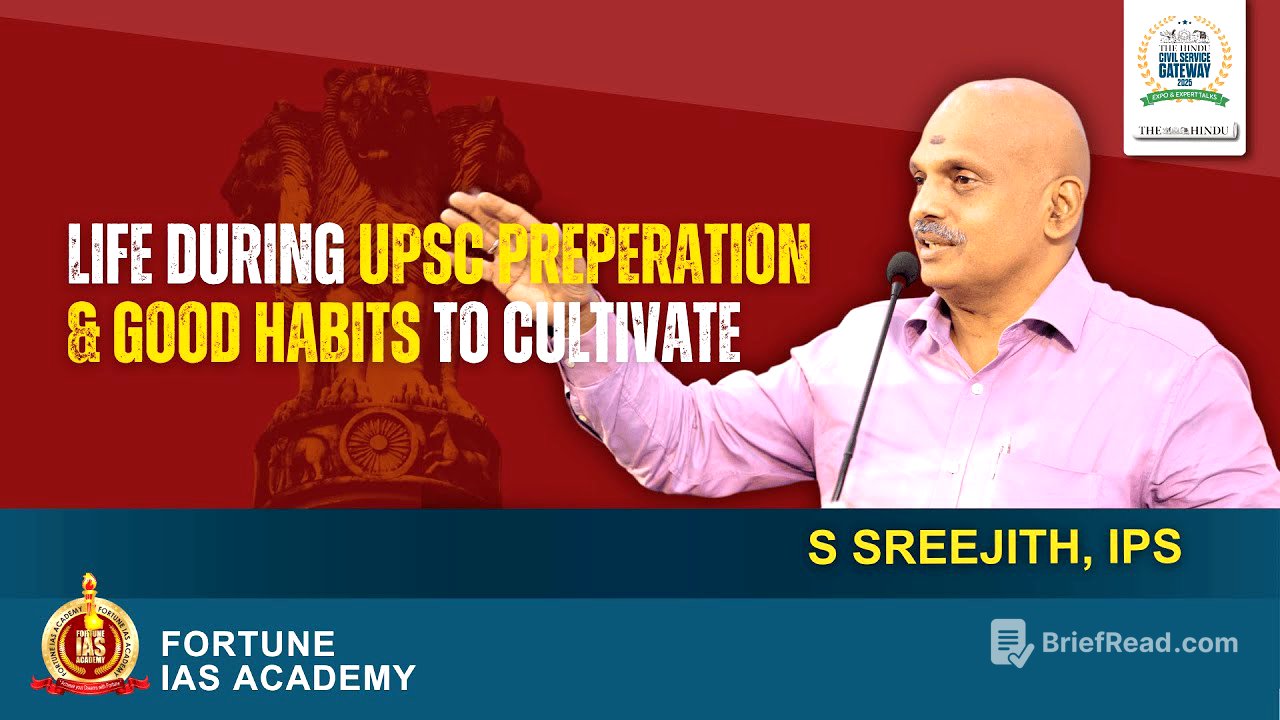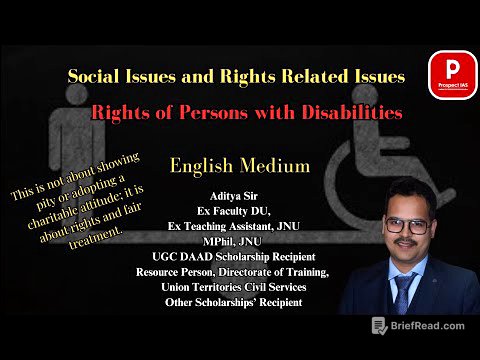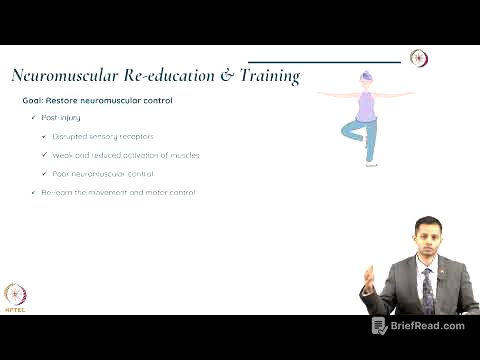TLDR;
This video features a speaker sharing personal anecdotes and insights related to the civil services exam, preparation strategies, and life lessons. The speaker emphasizes the importance of perseverance, self-awareness, and understanding the true nature of the exam. They also touch on the significance of ethics, societal perspectives, and maintaining a balanced approach to life and studies.
- Personal anecdotes and experiences related to the civil services exam.
- Preparation strategies and insights.
- Importance of perseverance, self-awareness, and understanding the exam's true nature.
- Significance of ethics, societal perspectives, and maintaining a balanced approach.
Introduction and Early Life [0:00]
The speaker begins by recounting instances where people questioned the ability to prevent events like tsunamis, leading to a reflection on general politics and political statements. They mention an incident where they associated "India" with "Exam." The speaker then shares details about their early academic life, mentioning their first rank in nursery and their experiences in school. They describe themselves as an ordinary Malayali and discuss the concept of negative inspiration, emphasizing that if they could succeed, anyone can.
Academic Background and Challenges [1:38]
The speaker discusses their academic qualifications, including their undergraduate degree and marks in SSLC (10th grade), where they scored 508 out of 600. They recount their decision to opt for the second group (biology) in their undergraduate studies, despite not liking biology, and how they deliberately reduced their marks in the subject. They express a greater interest in mathematics and share their marks in the subject. The speaker then talks about the challenges they faced in their second year, where they scored 52%, and the pressure from their family to study harder.
College Life and Extracurricular Activities [4:03]
The speaker narrates their college life, mentioning their admission to Sree Narayana Guru College for Mathematics. They reveal their low attendance record of 21 days over three years due to involvement in various extracurricular activities. They were actively involved in union activities, fine arts, and interzone events. The speaker recalls an event where they met Jayakumar Sir, who was the Chief Secretary and the collector of Kozhikode district at the time, and how he organized a seminar to encourage more women to join the civil service.
Political Views and Interactions [6:57]
The speaker shares their political views, describing themselves as very radical during their college days. They express their opinion on the term "women's empowerment," questioning its correctness and relevance. The speaker recounts an incident during a seminar where they spoke against certain statements, leading to a discussion with IAS officers. They mention the challenges of misinformation and the need to address perceptions and fears.
Encounter with IAS Officers and Motivation [9:35]
The speaker describes an encounter with IAS officers at a seminar, where they were given an opportunity to speak in English. They felt inadequate but were encouraged by the collector. The speaker emphasizes that success starts with a young starting point and shares an anecdote about their director, Ranjith, and a college mate, Radhika, who inspired them to become a collector. They also mention an incident where they were questioned about ISIS and taken to the police station.
Inspiration and Influences [12:54]
The speaker recounts an incident where Jayakumar Sir recognized them and acknowledged their potential. They also share a story about George, who grew up in a small village near Kottayam and was inspired to become an IPS officer after witnessing a police parade. The speaker emphasizes that there is nothing to lose by trying and encourages the audience to understand that success is accessible to them.
Challenges and Setbacks [15:21]
The speaker discusses the challenges of the exam and shares the story of Vivek Ramachandran, who missed the cutoff for the mains multiple times. They also mention a brilliant friend who qualified but is now the MD of a large bank in Abu Dhabi. The speaker talks about dealing with depression and the importance of not taking "no" for an answer.
Preparation and Initial Attempts [18:32]
The speaker recounts their decision to study for the civil service and their initial preparation. They joined All India Radio and got a job at customs, where they took leave to study in Delhi. They joined Ravusi coaching center but were undecided about their optional subject. They eventually chose anthropology after consulting with Pattacharya Sir.
Anthropology Studies and Lucknow Pact [20:16]
The speaker shares an anecdote from their anthropology class, where they were asked about the Lucknow Pact. They were unfamiliar with the topic but were helped by a friend who grew up in Delhi. The speaker explains the significance of the Lucknow Pact in the Indian National Movement and mentions the author Majudar, referring to a specific page and paragraph in a book.
Finding Study Partners and Initial Preparation [23:31]
The speaker recounts meeting a brilliant individual named Ramanna from Kadapa, who became their study partner. They discuss their study routine, which involved skipping classes and studying for 18 hours a day. The speaker also mentions the support they received from their colleagues at customs, particularly a man named Muhuddin, who allowed them to study and provided financial assistance.
First Year of Preparation and Prelims [25:41]
The speaker describes their initial preparation, which was unstructured and lacked direction. They emphasize the importance of finding good friends and maintaining a positive mindset. The speaker shares their experience of qualifying for the prelims and the importance of realistic assessment. They also mention a friend who qualified in the prelims but didn't clear the mains due to writing excessive words in the exam.
Mains and Optional Subject [29:17]
The speaker discusses their experience of clearing the mains and their choice of anthropology as their optional subject. They describe their deep interest in the subject and how it influenced their dreams and thoughts. The speaker also mentions their first year of service in the Forces Headquarters Service and their desire to join the IPS.
Motivation for IPS and Service Preferences [31:17]
The speaker shares their motivation for wanting to join the IPS, which stemmed from their childhood experiences and admiration for police officers. They recount an incident where Vivek Ramachandran's father, an IPS officer, encouraged them to consider the police service. The speaker initially preferred IFS but was convinced to prioritize IPS due to its unique opportunities and challenges.
Diplomatic Service and Challenges [32:50]
The speaker mentions Nirupama Rao and discusses the constraints and difficulties faced in the diplomatic service. They emphasize that a policeman can always be a policeman and share their wife's perspective on their role. The speaker also recounts instances where they received threats and the importance of maintaining hope and resilience in the police service.
IPS as First Choice and Preparation [35:10]
The speaker reaffirms their decision to choose IPS as their first choice and describes their preparation routine. They mention Frank Philip, who supported them by providing a place to study and ensuring they were locked in to focus. The speaker details their daily schedule, which involved studying for long hours, listening to music, and taking breaks to walk and socialize.
Study Group and Exam Strategies [37:57]
The speaker discusses their study group in Vikaspuri, which included Sandeep Chakravarthy, who later joined the Foreign Service. They describe their method of homeschooling and learning by sight, focusing on critical evaluation and different perspectives. The speaker also shares an anecdote about Sandeep, who stopped studying ten days before the exam but still managed to rank 5th.
Prelims vs. Mains and Preparation Method [41:48]
The speaker shares their understanding of the prelims, considering it tougher than the mains. They emphasize the importance of stamina and endurance in the mains. The speaker then transitions to discussing the personality test and their preparation method.
Personality Test and Devadasi System [42:20]
The speaker recounts their experience with the personality test, where they were asked about their background in Bharatanatyam and Mohiniyattam. They were also questioned about the Devadasi system, which they were familiar with. The speaker shares their views on sex work in India, arguing against its abolition and emphasizing the need to consider the consequences.
Moral Dilemmas and Societal Perspectives [47:17]
The speaker discusses the moral dilemmas associated with sex work and the importance of considering societal perspectives. They emphasize the need to study society dispassionately and understand how it sustains itself. The speaker shares their score in the personality test and emphasizes that their views were based on sociological understanding rather than personal morality.
Qualities of a Civil Servant [48:43]
The speaker reflects on their civil service experience and emphasizes the importance of being a good civil servant. They highlight the need for average intelligence, a willingness to work harder, and the ability to bridge the gap between the government and ordinary people. The speaker also emphasizes the importance of being ordinary and approachable.
Stress Management and Advice for Aspirants [51:33]
The speaker discusses the stress associated with UPSC preparation and the importance of managing it effectively. They advise aspirants to study consistently, increase their study time gradually, and bring their mind and body into a state of readiness. The speaker also emphasizes the importance of being an average student and not being intimidated by intellectual giants.
Background and Syllabus [55:57]
The speaker addresses a question about their background and the UPSC syllabus. They advise aspirants to analyze question papers, identify their strong points, and prepare intelligently. The speaker also emphasizes the importance of learning from lessons and incorporating innovations.
Time Management and Habits [58:54]
The speaker discusses time management and the importance of forming good habits. They use the example of teaching an elephant to brush its teeth to illustrate the need for consistent effort and decision-making. The speaker also advises aspirants to address bad habits and inculcate good ones through consistent practice.









